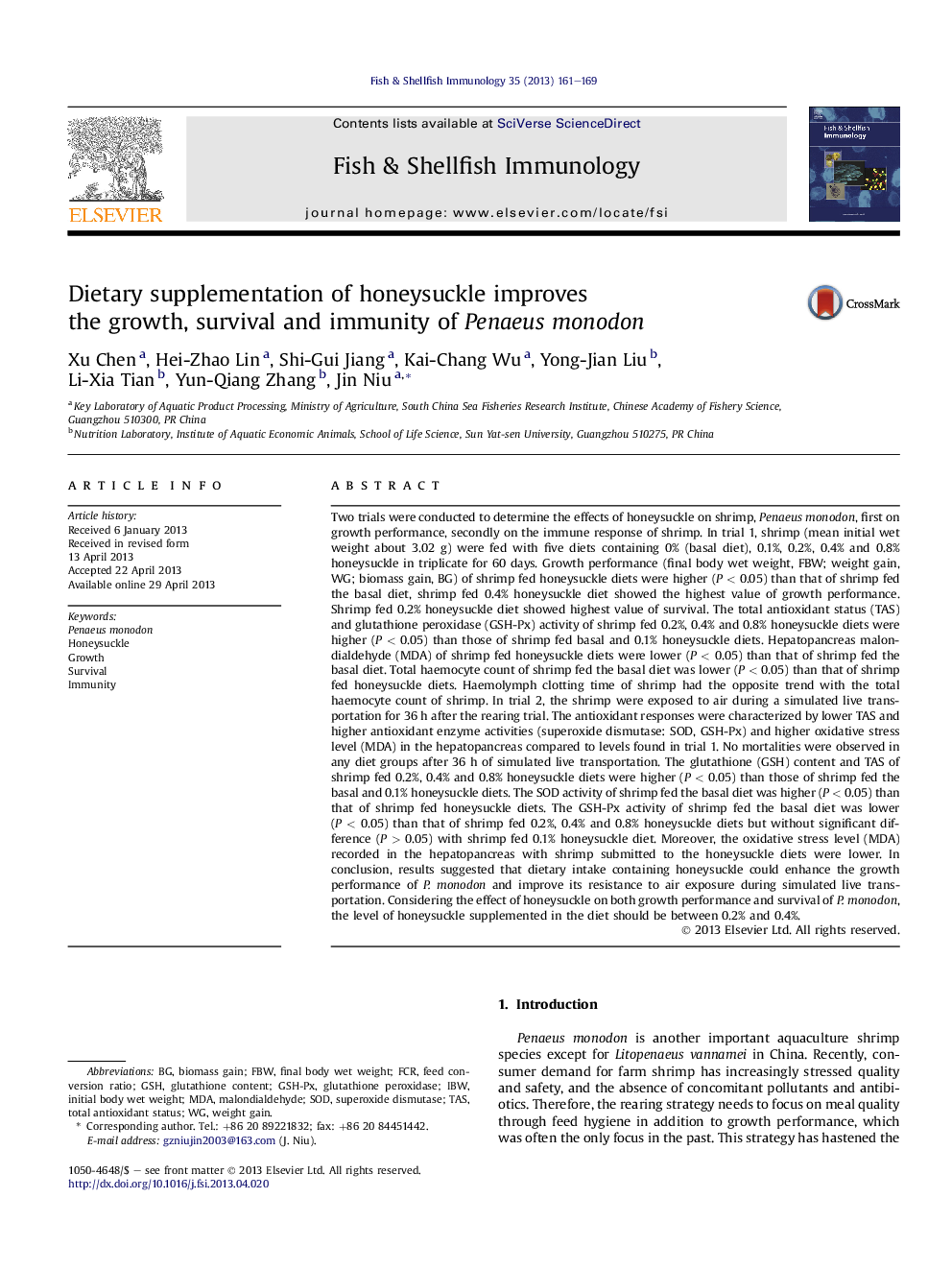| کد مقاله | کد نشریه | سال انتشار | مقاله انگلیسی | نسخه تمام متن |
|---|---|---|---|---|
| 2432085 | 1106779 | 2013 | 9 صفحه PDF | دانلود رایگان |

• Dietary honeysuckle could enhance the growth performance of Penaeus monodon.
• Dietary honeysuckle could improve P. monodon resistance to air exposure.
• Economic dietary honeysuckle level was estimated as 0.2%–0.4% for shrimp pellet.
Two trials were conducted to determine the effects of honeysuckle on shrimp, Penaeus monodon, first on growth performance, secondly on the immune response of shrimp. In trial 1, shrimp (mean initial wet weight about 3.02 g) were fed with five diets containing 0% (basal diet), 0.1%, 0.2%, 0.4% and 0.8% honeysuckle in triplicate for 60 days. Growth performance (final body wet weight, FBW; weight gain, WG; biomass gain, BG) of shrimp fed honeysuckle diets were higher (P < 0.05) than that of shrimp fed the basal diet, shrimp fed 0.4% honeysuckle diet showed the highest value of growth performance. Shrimp fed 0.2% honeysuckle diet showed highest value of survival. The total antioxidant status (TAS) and glutathione peroxidase (GSH-Px) activity of shrimp fed 0.2%, 0.4% and 0.8% honeysuckle diets were higher (P < 0.05) than those of shrimp fed basal and 0.1% honeysuckle diets. Hepatopancreas malondialdehyde (MDA) of shrimp fed honeysuckle diets were lower (P < 0.05) than that of shrimp fed the basal diet. Total haemocyte count of shrimp fed the basal diet was lower (P < 0.05) than that of shrimp fed honeysuckle diets. Haemolymph clotting time of shrimp had the opposite trend with the total haemocyte count of shrimp. In trial 2, the shrimp were exposed to air during a simulated live transportation for 36 h after the rearing trial. The antioxidant responses were characterized by lower TAS and higher antioxidant enzyme activities (superoxide dismutase: SOD, GSH-Px) and higher oxidative stress level (MDA) in the hepatopancreas compared to levels found in trial 1. No mortalities were observed in any diet groups after 36 h of simulated live transportation. The glutathione (GSH) content and TAS of shrimp fed 0.2%, 0.4% and 0.8% honeysuckle diets were higher (P < 0.05) than those of shrimp fed the basal and 0.1% honeysuckle diets. The SOD activity of shrimp fed the basal diet was higher (P < 0.05) than that of shrimp fed honeysuckle diets. The GSH-Px activity of shrimp fed the basal diet was lower (P < 0.05) than that of shrimp fed 0.2%, 0.4% and 0.8% honeysuckle diets but without significant difference (P > 0.05) with shrimp fed 0.1% honeysuckle diet. Moreover, the oxidative stress level (MDA) recorded in the hepatopancreas with shrimp submitted to the honeysuckle diets were lower. In conclusion, results suggested that dietary intake containing honeysuckle could enhance the growth performance of P. monodon and improve its resistance to air exposure during simulated live transportation. Considering the effect of honeysuckle on both growth performance and survival of P. monodon, the level of honeysuckle supplemented in the diet should be between 0.2% and 0.4%.
Journal: Fish & Shellfish Immunology - Volume 35, Issue 1, July 2013, Pages 161–169